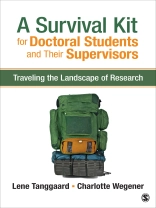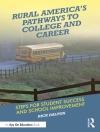A Survival Kit for Doctoral Students and Their Supervisors offers a hands-on guide to both students and supervisors on the doctoral journey, helping make the process as enjoyable as it is productive. Drawing on research from peer learning groups, contributed narratives, and their own programs, the authors emphasize the value of the doctoral partnership and the ways in which shared knowledge can facilitate a rewarding journey for students and their advisors. Grounded in theoretical and empirical material, the book helps participants navigate the doctoral process with personal stories and examples from a variety of researchers. A discussion of common challenges and the inclusion of practical tips further enhance the book’s diverse range of helpful resources.
Inhoudsopgave
Chapter 1: Theoretical Basis of the Book
An Apprenticeship Perspective
Why Apprenticeship?
Things Elites Can Teach Us
What Is Apprenticeship In Research And What Can Be Learn From It?
The Ph D Endeavour as a Journey
A Pedagogy of Doing
Moving Away From Pure Learning
Good Advice for the Ph D Student
Good Advice for the Supervisor
Conclusion
Chapter 2: Matching Student and Research Community
Successful and Unsuccessful Matching
Why Research Talent Is Relationally Defined and Achieved
Relational Talents
Finding the Right Match
What Is Needed To Find The Match?
Mismatch
Finishing On Time?
Why Matching Can Be Difficult
Good Advice for the Ph D Student
Good Advice for the Supervisor
Conclusion
Chapter 3: Originality and Contribution
Making an Impact
We Have To Work It Out Ourselves – But How?
Developing Voice
An Experiment of Disarmament
Dismantling Pretentious Scientific Language
Complying and Adjustment
Questioning the Research Question
Good Advice for the Ph D Student
Good Advice for the Supervisor
Conclusion
Chapter 4: Making the Most of Obstacles
Research as a Creative Endeavor
How Can I Contribute and Do Creative Research?
Data on Deviations and Research in Everyday Life
How Can We Stumble Creatively?
Absorption and Deadlines
Forced Incubation
Apprenticeships and Quick Learning
The Mc Donaldisation of Research
Good Advice for the Ph D Student
Good Advice for the Supervisor
Conclusion
Chapter 5: Peers and Masters Are Everywhere
Distributed Masters
Apprenticeship Writing
Writing and Identity Formation in Peer Groups
Writing Throughout the Journey
Networks
Writing Groups
Do I Have The Time … And The Courage?
Life Itself Is a Master
Be a Master Yourself
Good Advice for the Ph D Student
Good Advice for the Supervisor
Conclusion
Chapter 6: Doing Supervision
Supervision as Process and Production
Co-Authorship as a Pedagogic Practice
The Co-Author Study
Inviting In—Unconditionally Accepting
Idea Testing and Getting the Student to Work
Theoretical Framing
Focused Asking For Advice and Making Structural Adjustments
Fine Tuning and Some Deletions
Sharing Completion
Extending the Radius of the Research Community
A Pedagogy of Doing
Good Advice for the Ph D Student
Good Advice for the Supervisor
Conclusion
Chapter 7: Feedback – Part of Making It Work
A Range Of Options
A Good Writer Is Not Necessarily a Good Writing Teacher
Feed-Back from an Apprenticeship Perspective
Formative Apprenticeship
Writing for ‘Real’ and ‘Blind’ Reviewers
The Necessity of Untidy Texts
The Circularity of Knowing
‘People Think by Acting’
Retrospective Preparation?
Learning from Giving Feedback
Good Advice for the Ph D Student
Good Advice for the Supervisor
Conclusion
Chapter 8: ‘Get a Life’ or Simply ‘Live Your Life’
Putting an End to Uncertainty?
Moving Fast or Learning to Live a Researcher’s Life?
In Search Of a Researcher Identity
Always In the Middle
It Is Good To Be Part of Something
There Is Always Work To Do
Always Heading Somewhere
‘Let’s Start Before We’re Ready’
Stepping Stones for a Future Career
Good Advice for the Ph D Student
Good Advice for the Supervisor
Conclusion












